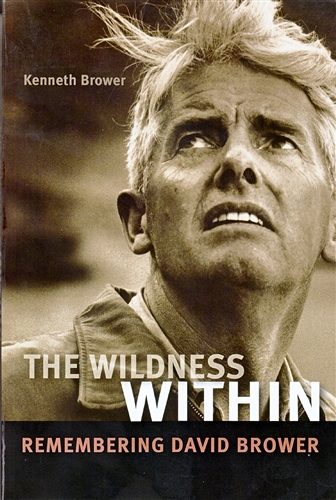David Brower’s legacy is unparalleled. The visionary activist practically created the environmental movement, and he might be its most controversial and influential figure. Brower transformed the Sierra Club from a group concerned primarily with California into the most powerful environmental organization in the US. Later he founded Friends of the Earth, which became a force for the protection of nature worldwide. Brower also made his share of enemies along the way, including the boards of both the Sierra Club and Friends of the Earth.
David Brower’s legacy is unparalleled. The visionary activist practically created the environmental movement, and he might be its most controversial and influential figure. Brower transformed the Sierra Club from a group concerned primarily with California into the most powerful environmental organization in the US. Later he founded Friends of the Earth, which became a force for the protection of nature worldwide. Brower also made his share of enemies along the way, including the boards of both the Sierra Club and Friends of the Earth. Eventually, both launched internal coups to oust the uncompromising warrior, who cared little for the organizations’ long-term fiscal stability.
The Wildness Within: Remembering David Brower was written and edited by Brower’s son, and it is surprisingly good at providing details about the complexity of the subject’s character. No meaningful biography of Brower has been attempted before, save for John McPhee’s acclaimed 1971 book Encounters with the Archdruid. Brower wrote two autobiographical books in the decade before his death, but as one reviewer noted, they were eclipsed by the “towering ego” of the author-protagonist.
Published on the 100th anniversary of Brower’s birth, The Wildness Within tries to fill this void with the recollections of 19 environmental leaders, disciples and friends who knew him during his divisive rise. Paul Ehrlich, Paul Hawken and Amory Lovins – some of the greatest thinkers of our time – speak fondly of Brower’s passion and influence. Ehrlich, now a professor at Stanford, credits Brower with the idea for The Population Bomb, a controversial book that elevated population issues to the fore of environmental debates.
No one can question Brower’s influence or success. He pioneered the use of photography, video and mainstream newspaper advertising to pressure politicians. His uncompromising fight to protect wilderness created the political space that was necessary to legally entrench environmental protection. After losing the battle to stop the damming of the Colorado River’s Glen Canyon in the 1950s, Brower led the charge to protect the Grand Canyon and pass the 1964 US Wilderness Act, which has since preserved millions of hectares.
It’s clear that Brower’s legacy lives on. He has inspired many young people to take on daunting challenges, in part by giving them a kind word at the right time. Just ask Jerry Mander, who wrote the famous “Should We Flood the Sistine Chapel?” ad that appeared in The New York Times and helped save the Grand Canyon. Mander, an ad man who later founded several environmental organizations, said Brower’s influence “really changed me. I’ve said it before, that drunken night [with Brower] at the Biltmore Hotel actually changed my heart and head.”
But Brower could also be egotistical and impulsive. This was part of what made him bold and successful, but was also a hallmark of his tragic heroism. He made major decisions – like starting a Friends of the Earth office in London, England – without discussing them with his board of directors. He was notorious for doing more than his organizations could afford, a reckless strategy that pushed these NGOs to the brink of bankruptcy.
The Wildness Within is an oddly structured book. Rather than asking the contributors to write their own essays, Kenneth Brower interviewed each one. This results in conversational chapters that read easily, but in which interviews are not presented as such. One can only assume that Kenneth Brower rewrote the interviews as personal essays. While this approach provides insight into a complex icon, it is a far cry from what the historical record deserves. This gap in Brower scholarship exists largely because his family has not made his papers available to biographers. While this book does provide a more complete picture of the man, it is time to let someone outside the Brower tribe sift through the record and write his life.
The Wilderness Within: Remembering David Brower, Kenneth Brower, Berkeley, California: Heyday Books, 2012, 320 pages
This review originally appeared in Greenbelts, Issue 39.2. Subscribe now to get more book reviews in your mailbox!
Reviewer Information
Jeff Gailus is an award-winning writer and author of The Grizzly Manifesto and Little Black Lies: Corporate and Political Spin in the Global War for Oil.













